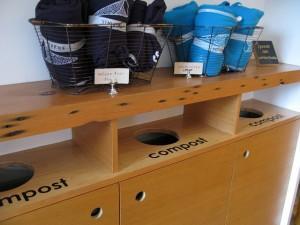
I ran into this “problem” the other day. After eating lunch in a publicly-owned cafeteria for the first time, I started looking for a trashcan to throw away my utensils and lunch containers, but came up short. Even after several minutes of searching, I was unable to find a single waste bin. Instead, I was confronted with a series of large recycling bins: one for paper, plastic, glass, compost, and so on.
It caught me off guard and really made me think – is this actually possible? Can a bustling cafeteria operate while producing zero “trash,” or were they just hidden or being emptied? After asking around, I confirmed that there really are no trashcans, except for a small one next to the coffee machine. Sure, I could throw away both halves of the sushi box in the plastic recycling bin, but where would I discard smaller items like the wooden chopsticks, plastic fork, and empty packets of soy sauce? I was cornered. After some mental conflict, I gave up and tossed the chopsticks in the paper bin, and the soy sauce packets and fork in the plastics bin, though I wasn’t sure if they were actually recyclable. Looking back, I think maybe the chopsticks should have been composted, but given the alternative of walking back to my office with open packets of soy sauce and dirty chopsticks and a fork, I stand by my decision.
This event made me think about recycling, and what is actually allowed to go in recycling bins — there always seems to be some debate. So, I decided to look up a few common items that I think cause confusion and answer the question: Can it go in the recycling bin?
Plastic Bags: No. While plastic bags can be recycled, they should not go in the recycling bin, nor should you put recyclables in a plastic bag. Recycling Week has a detailed answer, but the short of it is that they interfere with automatic sorting machines, and it’s too dangerous and laborious for recycling centers to open bags. However, a Charmeck study shows that a few municipalities collect plastic bags in curbside recycling, but they must be bagged together.
Aluminum Foil: Sometimes. Aluminum foil, pie plates and other food trays can be recycled, but most centers only accept them if they’re clean. Only half the municipalities in the Charmeck study accepted aluminum foil, so be sure to check your location online.
Aerosol Cans: Sometimes. These are usually limited to non-hazardous empty aerosol cans. Again, only half the municipalities in the Charmeck study accepted these, but a quick Google search should give you the answer for your waste management service.
Metal Jar lids and Bottle Caps: Unlikely. Only a handful of the locations in the aforementioned study recycled these.
Cartons: Usually, at least in the locations covered by the study. This applies to gable top cartons, like orange juice or milk.
Coated Papers: Unlikely. As the study notes, this essentially refers to hot drink cups.
The lesson here is, what’s recyclable in one county may not be in another, So if you’re not sure, look it up!




